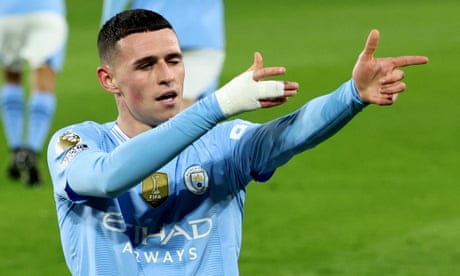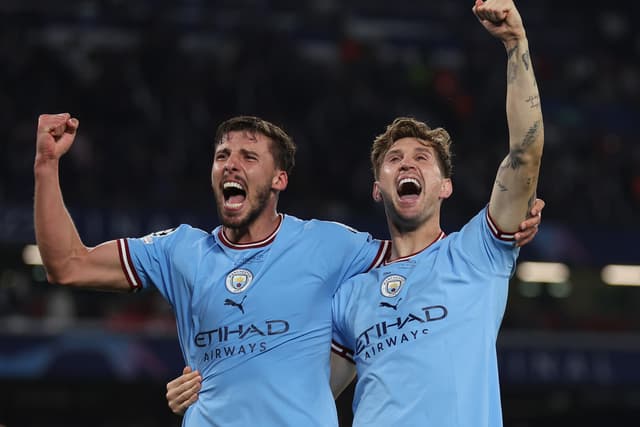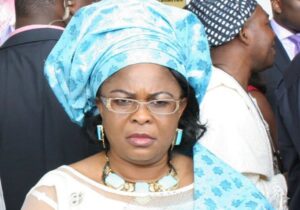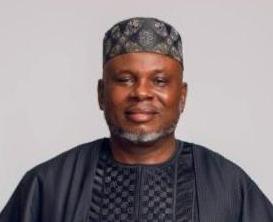Can anybody stop Guardiola’s juggernaut and, if not, what does a double-treble say about the health of football?
And so it came to pass. Although it has to be said, and with all due deference to the need for a little dramatic tension, in precisely the way most people watching seem to have expected.
As the Premier League season begins to narrow, the frontrunners heading into the home bend will look reassuringly familiar for Manchester City. Whatever chance there might have been of an outsider in the medal spots appears to have been safely reeled in. The remaining challengers are already straining at full capacity. Eyes boggled, hamstrings squeaking as, on their shoulder, a blur of silken shorts and skinny-legged resolve with Pep Guardiola readying himself for the familiar kick to the line.

Victory at Brentford on Monday night makes it 11 wins and a draw in City’s last 12 games across all competitions. The three key players from last season’s innovative treble-winning structure, Kevin De Bruyne, John Stones and Erling Haaland, are all approaching fully operational status, ready to appear on the pitch together for the first time since the Champions League final in June. And beyond the bleachers there is a sense of some wider sky beginning to beckon
By Tuesday morning City were listed at 9-1 with the bookies not just to win the league, not just to win the double, or indeed the treble, but to win a first ever double-treble. It is measure of this team’s unparalleled certainties, their ability to win games while steamrollering any real sense of competitive variables, that this still feels cautious; that a feat no other team have achieved seems like the default option from here, a thing that is more rather than less likely to happen.
At which point, it is worth asking three questions. First, what exactly is at stake? The answer to which is: sporting immortality. City have 16 league games left to play, plus a maximum of four in the FA Cup and seven in the Champions League. Perform to their capacities and they are within a routine final surge of successive trebles, six Premier League titles out of seven and a coronation as unarguably the greatest team of the modern age. Or indeed, ever.
Football loves an ill-fitting comparison across the decades. Comparing success now to the achievements of, say, Jock Stein’s Celtic is a journey without maps or scale or context. But it is still possible to be great in any era and this is undeniably select company. What are we looking at? Bob Paisley-era Liverpool? Golden-age Real Madrid? The Ajax of Johan Cruyff? The Bayern Munich of Franz Beckenbauer? This is the kind of footprint City can leave in the next three months.
To many neutrals such success in the stratified modern game will carry a sense of economic inevitability, a symptom also of something broken in the way the sport arranges itself now. Not to mention, because nobody seems to want to, the issue of those 115 unresolved charges for breaking financial rules. City deny any wrongdoing.
But it is also worth remembering that nothing lasts forever. Eras always seem inevitable while they’re happening. Guardiola will at some point leave and the perfect ripeness of the current team will edge into something else. Other empires will rise. This is City’s chance, right here, to gouge their hands right into this thing and suck the sweetness out.
At which point the obvious follow-up question arises: can anyone stop them? There is a vague sense that the opportunity may already have passed in the Premier League. To date City’s season has felt like a three-stage tune-up. Part one was a necessary fudge that saw De Bruyne and Stones injured and a Haaland-centred team still trying to play the Haaland-centred structure of last year, and stumbling in mid-season. Part two arrived with Haaland’s injury, which may even have been a blessing, as a functional 4-2-3-1, a more classically Guardiola-looking team with Julián Álvarez as the central striker, won 10 games out of 11. And now we have this: the key parts are fit and well, the Death Star is readying its destructor beam and is preparing to enter annihilation mode once again.
There is still a distinct period of peril in City’s run-in. Between 10 March and 20 April five of their seven league fixtures are: Liverpool away, Brighton away, Arsenal at home, Aston Villa at home and Tottenham away. But then, this kind of run feels like an aspect of City’s strength, the place where they win rather than lose titles. Arsenal also have a tough final run: five of their last nine games are City away, Brighton away, Spurs away, Manchester United away and Villa at home. Liverpool have to go to Goodison Park, Old Trafford and Villa Park.
It is in these moments the astonishingly coherent architecture of this City project becomes clear, from ownership vision to the basic texture of the football. It is a little overlooked but there is a perfect fit between the Guardiola style, which is about control first of all, mastering the ball, destroying the variables that might bring defeat and the billionaire-ball model of City’s nation-state owners, which also involves creating a structure of such impenetrable wealth that its aim is to remove the possibility of defeat.
The current City team is the end point of that novel process, a culmination of 10 years of never actually having to sell a player, of generating the largest revenues in world football thanks to some wonderfully far-sighted regional sponsors, of total structural coherence underwritten by a politically driven sovereign wealth fund. That certainty of method and resources is there in the details of the title run in. Arsenal’s backup strikers are Eddie Nketiah and Kai Havertz. Liverpool will be desperate for Mohamed Salah’s return, and reliant in the meantime on the seductive chaos-ball of Darwin Núñez. Meanwhile, City’s backup striker is the second-best No 9 in the league, and their No 1 is the greatest pure finisher in the world. The only real choice for Guardiola is deciding which weapon to kill you with.
Confronted with this, a final question arises. City are beautiful to watch. The players are brilliantly skilful and brilliantly disciplined. But is it actually interesting? Or interesting enough? It was notable in the broadcast of the Brentford game that Sky Sports seemed to be making a very conscious effort to develop a City narrative.
Much was made of the De Bruyne-Haaland relationship, which is remarkably productive. But then De Bruyne is a remarkably creative footballer and Haaland the most obvious expression of City’s version of sporting inevitability. How do you stop the unstoppable, Sky’s commentators asked. It turns out you don’t. Haaland made Phil Foden’s third goal with a nice little static lay-off, and made the second by forcing Brentford to double mark him.
Haaland may lack artfulness. He may be one of the least interesting brilliant footballers ever devised, a superstar defined purely by his astonishing numbers, a paradox of the non-passing footballer in one of the great passing teams. But he is also in many ways another end point of Guardiola’s vision, another point of total certainty, and perhaps the defining presence either way as that double-treble looms.










More Stories
Amorim insists Fernandes not leaving Manchester United amid Madrid reports
How debt burden pushed Nigerian boxer Segun Olanrewaju to a fight that took his life
Nigeria Taekwondo Federation boss, Abdullahi Saidu dies at 53